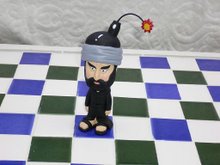
From The Times
April 28, 2007
7/7 ‘mastermind’ is seized in Iraq
Sean O’Neill, Tim Reid and Michael Evans
The al-Qaeda leader who is thought to have devised the plan for the July 7 suicide bombings in London and an array of terrorist plots against Britain has been captured by the Americans.
Abd al-Hadi al-Iraqi, a former major in Saddam Hussein’s army, was apprehended as he tried to enter Iraq from Iran and was transferred this week to the “high-value detainee programme” at Guantanamo Bay.
Abd al-Hadi was taken into CIA custody last year, it emerged from US intelligence sources yesterday, in a move which suggests that he was interrogated for months in a “ghost prison” before being transferred to the internment camp in Cuba.
Abd al-Hadi, 45, was regarded as one of al-Qaeda’s most experienced, most intelligent and most ruthless commanders. Senior counter-terrorism sources told The Times that he was the man who, in 2003, identified Britain as the key battleground for exporting al-Qaeda’s holy war to Europe.
Abd al-Hadi recognised the potential for turning young Muslim radicals from Britain who wanted to become mujahidin in Afghanistan or Iraq into terrorists who could carry out attacks in their home country. He realised that their knowledge of Britain, possession of British passports and natural command of English made them ideal recruits. After al-Qaeda restructured its operations in Pakistan’s tribal areas he sought out young Britons for instruction at training camps. In late 2004 Abd al-Hadi met Mohammad Sidique Khan and Shehzad Tanweer, from Leeds, at a militant camp in Pakistan and, in the words of a senior investigator, “retasked them” to become suicide bombers.
They were sent back to Britain where they led the terrorist cell that carried out the 7/7 bombings, killing 52 Tube and bus passengers.
Pakistani intelligence sources said that Abd al-Hadi was also in contact with Rachid Rauf, a Birmingham man now in prison in Pakistan and alleged to be a key figure in last summer’s alleged plot to blow up transatlantic airliners in mid-flight.
Abd al-Hadi has also been linked to a number of other foiled al-Qaeda plots to carry out attacks in Britain. But the Security Service, which has previously sent officials to question detainees at Guantanamo Bay, may not have the opportunity to question him directly.
The Government’s recently adopted position in favour of closing Guantanamo Bay is likely to act as a bar on agents travelling there. British Intelligence would have to rely on relaying questions it would like asked by American interrogators.
Security sources said they assessed Abd al-Hadi as a key operational commander, high up the chain in the al-Qaeda structure who was behind many key plots in the UK.
He had a close link with another arrested al-Qaeda figure and, the sources said, would have “a wealth of information”. He is thought to have been in contact with Osama bin Laden before his capture and might be able to provide information about his leader’s whereabouts.
Bryan Whitman, a Pentagon spokesman, said that Abd al-Hadi had been classified as a “high-value detainee” at Guantanamo, and joined 14 others, including Khalid Sheikh Mohammed, the 9/11 mastermind, as the most senior terror suspects at the Cuba prison.
Mr Whitman refused to say when or where he was captured, or by whom. “Abd al-Hadi was trying to return to his native country, Iraq, to manage al-Qaeda's affairs and possibly focus on operations outside Iraq against Western targets,” Mr Whitman said.
He added that he was a key al-Qaeda paramilitary leader in Afghanistan in the late 1990s, and between 2002 and 2004 led efforts to attack US forces in Afghanistan with terrorist units based in Pakistan.
In a lecture this week Deputy Assistant Commissioner Peter Clarke, commander of Sctoland Yard’s Counter-Terrorism Command, said that the central al-Qaeda leadership was behind a spate of terror plots against Britain.
He said: “We have seen how al-Qaeda has been able to survive a prolonged multinational assault on its structures, personnel and logistics. It has certainly retained its ability to deliver centrally directed attacks here in the UK. In case after case, the hand of core al-Qaeda can be clearly seen.”
Sources said last night that few figures had been more important at the centre of the revived al-Qaeda. Abd al-Hadi is credited with forming its alliance with the insurgency in Iraq.
US officials said he was associated with leaders of other extremist groups allied with al-Qaeda in Afghanistan and Pakistan, including the Taleban.
Michael Scheuer, former head of the CIA’s bin Laden unit, told The Times that catching Abd al-Hadi was important but that it did not spell the end of al-Qaeda.
He said Abd al-Hadi had been an important figure in developing al-Qaeda’s strategy in the insurgencies in Iraq and Afghanistan and also helped to redirect its terrorist strategy in Europe.
Mr Scheuer, a senior fellow at the Jamestown Foundation in Washington, said: “It is a blow for al-Qaeda, especially in Iraq, where it will have consequences.
“But al-Qaeda always plans for succession, and there will have been someone lined up to take his place. It is nonsense to think that al-Qaeda is dead.”
 Our Boy kicking ass from the air in Afghanistan. The Taliban can sneak in, but it's a bit tougher to sneak out after their lame ambushes.
Our Boy kicking ass from the air in Afghanistan. The Taliban can sneak in, but it's a bit tougher to sneak out after their lame ambushes.








